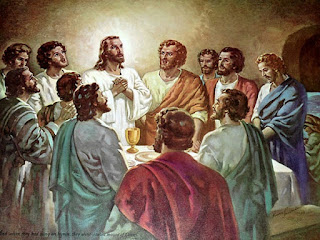 |
| The Eucharist |
The Cup of Blessing
Lenten Reflections from a Father who keeps His Promises by
Scott Hahn
Tuesday of Holy Week
“The cup of blessing which we bless, is it not a
participation in the blood of Christ?” – 1 Corinthians 10:16
As I studied the ancient Jewish Passover liturgy, I learned
that the seder meal was divided into four parts, which correspond to the four
different cups that were served. The
preliminary course consisted of a solemn
blessing pronounced over the first cup of wine, which was followed by a dish of
bitter herbs. Next the Passover
narrative was recited, after which Psalm 113 was sung. Drinking the second cup of wine immediately
followed.
Third, the main meal was served, consisting of lamb and
unleavened bread, which proceeded the drinking of the third cup of wine, known
as the “cup of blessing”. Finally the
climax of the Passover came with the singing of Psalms 114—118 and drinking the
fourth cup of wine, the “cup of consummation.”
 |
| The Last Supper |
Many New Testament scholars see this pattern reflected in
the Gospel narratives of the Last Supper.
In particular, the cup that Jesus blessed and distributed is identified
as the third cup of the Passover meal. Paul identifies this “cup of blessing” with
the cup of the Eucharist (see 1 Corinthians 10:16).
. . . . .
Wednesday
of Holy Week
“Truly, I say to you, I shall not drink again of the fruit
of the vine until that day when I drink again of the fruit of the vine until
that day when I drink it new in the kingdom of God.” – Mark 14:25
Instead of progressing immediately to the climax of the
Passover by drinking the fourth cup, the disciples and Jesus went to the Mount
of Olives (see Mark 14:26).
For students
of the Passover, Jesus’ skipping the fourth cup is almost the practical
equivalent of a priest’s omitting words of consecration at Mass or forgetting
Communion! Why did Jesus choose not to drink the fourth cup?
There in Gethsemane, Jesus prayed, “My Father, if it is
possible, let this cup pass from me” (Matthew 26:39). What cup was Jesus talking about? Some scholars identify the cup as “the cup of
God’s wrath” frequently mentioned by the Old Testament prophets (see Isaiah
51:17; Jeremiah 25:15). However, a more
basic connection is the more immediate context of Passover, which Jesus had
just been celebrating.
 |
| Agony in the Garden |
I then turned to the Gospel of John. For John, the hour of Jesus’ passion,
crucifixion, and death is also the hour of this greatest glory. His abject humiliations constitute his
exaltation; his apparent defeat at the hands of his enemies is seen as his
supreme triumph; his death is actually the
event that brings life to the world.
So, the “it” that was finished was the Passover that Jesus
had begun—but interrupted—in the Upper Room!
Its completion was marked by Jesus drinking sour
whine on Golgotha; the
fourth cup.
And Jesus calls us, as his
disciples, to not only partake of the cup of blessing (the third cup) which we
share in the Eucharist, but also of this fourth cup by dying for him (see Mark
10:38). Only then is the paschal mystery
truly fulfilled in us.
Excerpts from Lenten Reflections from a Father who keeps His Promises by Scott Hahn
I highly recommend this book! It has enlightened me to things that I have never understood... you can purchase this book at Amazon... it is available on Kindle.

No comments:
Post a Comment